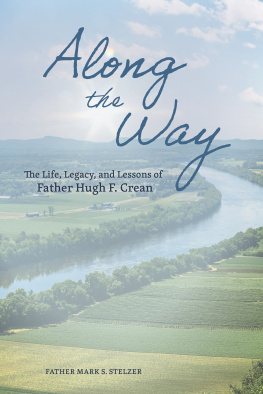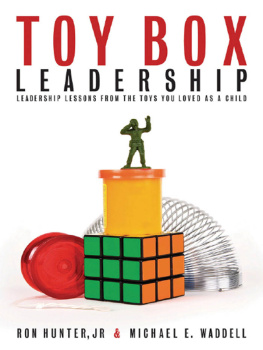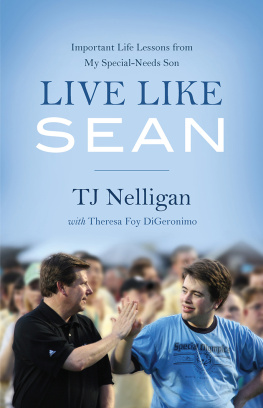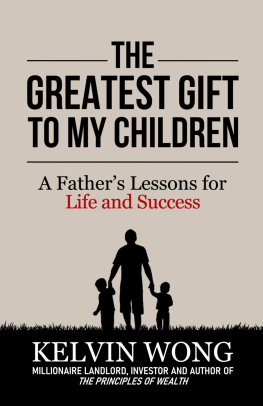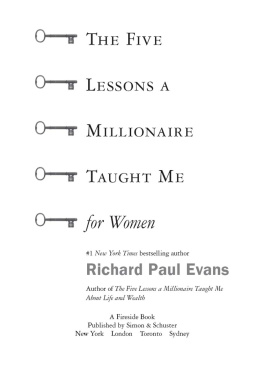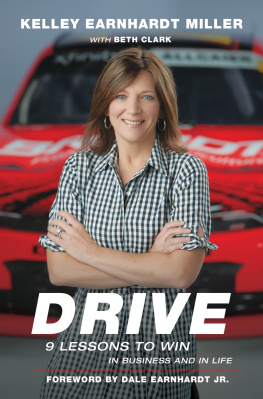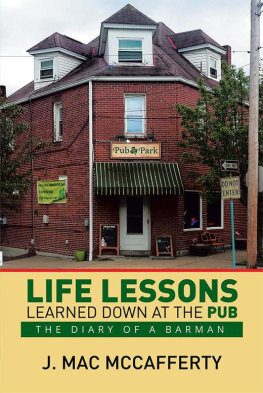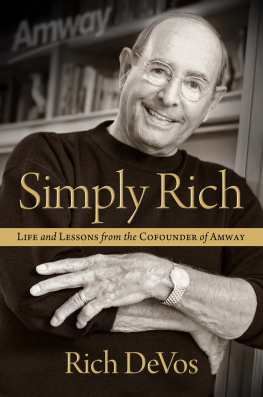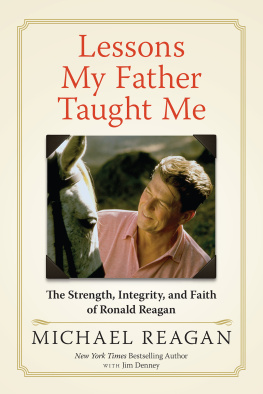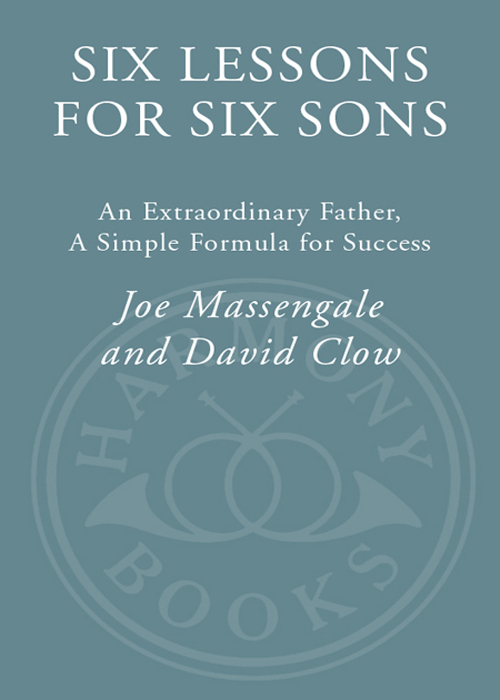
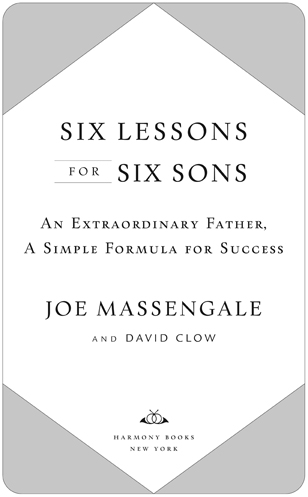
CONTENTS
FOR OUR PARENTS
Hugh T. Massengale and Susie W. Massengale
Albert J. Clow and Hannah M. Clow
FOREWORD
by George Foreman
IVE HAD three careers: boxer, preacher, and businessman. Four, if you count my misspent youth. In all four, I learned something valuable.
In each career I had setbacks and triumph. Ive been blessed to know the greatest victories a man can ask for, and Ive felt the sting of humbling defeat. As a boxer, I won and lost and won and lost again as heavyweight champion; as a preacher, I knew the rewards and sacrifices of sharing the Word; and as an entrepreneur, I face the same challenges any businessman faces to keep customers happy.
My life is an uncommon one, but the successes Ive enjoyed all had some simple common elements that can be shared no matter what you do or where you start. In every case, it was character that helped me win. Character is the tenacity to fail, learn and come back stronger. It is the grace to win with humility, to lose with dignity and to give your best in both. It is being honest with yourself, to listen only for the very best within you, seeking to improve who you are and what you do, to leave things better than you found them.
It surprises me sometimes that such a practical thing as character isnt taught alongside accounting and finance and marketing in business schools, because Ive never seen a business succeed without it. Many business disappointments happen because the personal qualities of character somehow got lost inside a company, and seemingly successful people reveal themselves to be spiritually bankrupt. As these people learned the techniques for accumulating earthly treasures, they lost the real meaning of living well and doing good work. If you define success too narrowly, you can succeed beyond your wildest dreams while losing your family, betraying your customers and leaving nothing behind but personal tragedy.
I try to keep this in my heart always in my most important work, being a father. My ten children have their own lives, their own paths to follow as they choose their careers and move out into the world. The specifics of my life might be of value to them, but none of my kids is likely to duplicate my path. My fights will not be theirs. The most valuable things I can give them are the simplest ones: a fathers love; trust in Gods grace and His hopes for them; and the character that will equip them to build good lives, good businesses and good families.
In this I have much in common with Joe Massengale. We come from the same part of East Texas. Our families worked the same land in Marshall, where I live today. We both know what it feels like to be hungry, to wear old clothes and cardboard in our shoes. We know the feeling of having to move house to house, and of being judged for having too little. We also know what its like to want more, and not to wait for opportunity but to make our own. We know the ambition to achieve something for our families, the drive to be successes in our businesses and the importance of doing things right.
Confidence, fortitude, pride, persistence, fearlessness and focus are some of the true treasures of the spirit that can get you past defeat, help you build a business, raise a family and leave a valuable legacy. The lessons Joe Massengale learned back in the piney woods around Marshall and gave to his sons to take into the world are some of the same ones I hope my children, my congregation, the kids in my youth center and my customers get from me.
Bestselling author, ordained minister, and two-time heavyweight boxing champion, George Foreman is the founder of the George Foreman Youth and Community Center. The father of ten children, he lives with his family in Texas.
INTRODUCTION
ON JULY 7, 2000, Marshall, Texas, witnessed a homecoming and a rite of passage, a reconciliation and a recognition of how the world changes. Joe Massengale, Sr., was back for his induction into the local Hall of Fame.
Marshall is a midsize Texas town three hours east of Dallas, but some of its children are known around the globe. Lady Bird Johnson is from Marshall. So are journalist Bill Moyers, who revisited in the mid-1980s to make a documentary, Marshall, Texas; Marshall, Texas, about the still-divided soul of the city more than a century after the Civil War; former heavyweight champion boxer George Foreman, who runs his thriving food and consumer products company from a 300-acre ranch northeast of the town; football quarterback Y. A. Tittle; and civil rights leader James Leonard Farmer. Like Joe Massengale, they left home to make their fortunes, and each in his or her own way acknowledged the lessons Marshall taught them by donating personal effects to the Hall.
The observance in the historic Harrison County Courthouse saluted a man with none of the natural gifts of the athletes or the education of the scholars. Joe had only his character to help him in life. That day, a heavyweight champion and a presidents wife and a broadcast journalist were joined in Marshalls heart by a tree trimmer, who, when he got back to Los Angeles from the celebration, would be out in his truck again selling his services door-to-door. But ultimately, Joe Massengales effect on the world may be the greatest of all. He left Texas with nothing and came home to Texas a winner. His gifts to Marshall were the tangible signs of just how powerful the American dream can be if one lives it every day.
Some of the greatest success stories America has are the quietest ones. Joe Massengales story of achievement took him from fear to hope and from hunger to abundance. It is more powerful because it is shared by so many people like Joe.
Best of all, Joes story is only a beginning. He has six exemplary sons, Joe Jr., Michael, Larry, Randy, Patrick and Andre. They gathered from around the country to be with him that day in East Texas. Even his sons did not fully understand until then how far their father had come, or all that his journey meant.
Marshalls pride for its son and grandsons was genuine, and Joe himself was so moved he could barely speak. Hanging in the same gallery as Y. A. Tittles number 14 New York Giants jersey and the mementos from Moyers and Foreman and the First Lady are memorabilia from Joe Massengales careers. He donated flyers from Joes Expert Tree Service, the first African-Americanowned landscaping company to succeed in Beverly Hills. He offered clippings from his work as a disk jockey and record producer in Los Angeles. From his racing days, Joe gave silks in the lavender and gold colors of Pemberton High, the school in Marshall where he announced one day to the classmates who laughed at his poverty that he was going to Los Angeles to get rich and someday hed come back in triumph.
The mayor proclaimed it Joe Massengale Day, and friends from Joes childhood joined city officials to pay their respects. The Marshall News-Messenger called him a Horatio Alger story. Joe was photographed with the statue of Lady Justice, brought down for restoration from her place atop the cupola of the Courthouse.
After the ceremonies, Joe showed his sons the spot in Courthouse Square where he used to shine shoes for nickels, and the road in the piney woods outside the town where, at age eight, he saw a man shot and dragged to death, and the thirty acres he took over at twelve when his father, Hugh Massengale, had to leave the family six days a week to find work where he could get it. Joe took his sons to the little graveyard where he buried Hugh in 1945. He had warned them about snakes in the undergrowththis is rattler countrybut the Massengale brothers wanted to see where Hugh lay to better understand the things Joes father had taught him, and how Joe was able to pass those things on.
Next page

